|
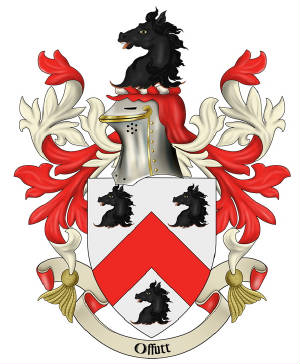
Heraldry officials in the United Kingdom insist that the Offutt surname is a phonetic variation of the surname Offord.
This has become evident based on new evidence found in the “Court Records of Prince George's County, Maryland 1696-1699.”
The change in spelling being based on the phonetics of various English accents which do not emphasize the “R”
sound as it would be pronounced in the majority of the United States today. Thus, the pronunciation of "Offutt" is the
British pronunciation of "Offord." This relaxation of the letter "R" can be found in Maryland as well. A birth record
of 1620 in the city of Fairfield, county of Stratford in England, records the birth of a Thomas Offord whose father was previously
recorded as Thomas Offott. This same Thomas Offord had his name recorded as Uffitt on the ship registry of the Lyon
headed to New England, and Offitt in New England Church marriage records. The Offord-Offutt spelling variation occurs several
times in English and New England records. One example of William Offutt's name appears in the "Court Records of Prince George's
County Maryland 1696-1699," as shown below, Thomas Date being the common denominator:
Volume 202
Page 54
Att Prince Georges County Court held att Charles Towne the 24th day of
November in the Eight yeare of his Majestys Reigne
Annoque Domini 1696 was
this following Docquett of writts Returned by the Sheriffe of the Said county
(viz.) William
Offord demands Capias against Thomas Date trespass on the Case: warrant etc. to arrest and returne ut Supra. [Ceppi.]
Page 106
Agreements Att Prince Georges County Court November the 24th Annoque
Domini 1696. These (22) Actions are agreed: William
Offoot against Thomas Date - trespass on the Case.
In the Will of William Offutt, the following statement is made concerning England:
"ITEM: All the rest, residue and remainder of my estate both real and personal - whether in England, Maryland or elsewhere
I give and bequeath the same, after my wife shall have deducted and received her third part of the same to my sons Samuel,
Nathaniel, Thomas and to my daughter Jane."
Many alternate spellings of Offord are linked to one of the Norman nobles at the Battle of Hastings, all sharing a common
root. Many of the spellings of Offord include; Offorde, Offorth, Offoot, Offott, Offutt, Uffitt, Ufford, Offworth, Offwurth,
and Offwood. It was not uncommon for a person to born with one spelling, married with another, and buried with a headstone
which showed another. Even during the time of Thomas Jefferson, spelling was by no means given the importance which we give
it today as the pronunciation was the greater factor. Thomas Jefferson himself stated, "I have nothing but contempt
for anyone who can spell a word only one way."
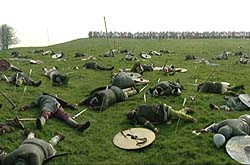
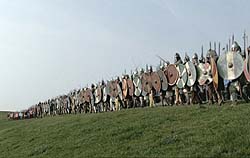
The ancestors of the Offutt family are descended from the Norman race. While the Normans are commonly believed to
be of French origin, in fact, the Normans were Vikings in France. The Vikings under their Jarl, Thorfinn Rollo, invaded France
in 911 A.D. Rollo laid siege to Paris and the French King, Charles the Simple, conceded defeat, granting Northern France to
Rollo. Rollo became the first Duke of Normandy. By the time the "Battle of Hastings" took place in 1066, the Normans had adopted
the French language and culture. William, Duke of Normandy, who invaded and defeated England in 1066 was descended from
Rollo.
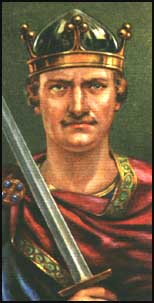
|
| William the Conqueror, Duke of Normandy |
The surname Offord is found in the Domesday Book which was a census of England taken in 1086 by William the Conqueror, Duke
of Normandy. After the Battle of Hastings in 1066, William, Duke of Normandy, having prevailed over King Harold II, granted
most of Britain to his many victorious Barons and became King of England, ending forever the reign of the anglo saxon Kings.
He granted lands to his sons, nephews, and other members of his family and they became known as the under-tenants. French became
the language of the English court. They brought the Norman system of surnames and heraldry from Northern France, to Britain,
which identified the under tenant with his holdings in order to distinguish him from the senior stem of the family. Therefore
the surname is descended from the tenant of the lands of Offord Cluny, held by Odo from Eustace the Sheriff who was a Norman
noble and half brother to William, having been recorded in the Domesday Book census of 1086. A family name capable of being
traced back to this document, or to the Battle of Hastings, is a mark of honor and distinction even to this day in England.
The distinguished surname Offutt, being derived from Offord is therefore a place name which can be found in Huntingdonshire,
Warwickshire, and Suffolk. The family spread out across the British isles over time accounting for later records in Wales,
London and central England, as well as Scotland.
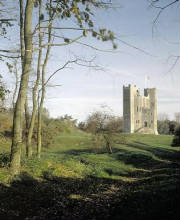
|
| Orford Castle, Estate of Robert de Offord, Earl of Suffolk |
Offord emerged as a notable English family name in the county of Huntingdon where they were anciently seated at Offord
in the parish of Ely. Robert de Offeworth held the family estate in 1221, Edeline succeeded to the estates in 1273, and Robert
de Offord, in 1327. Robert de Offord, The Earl of Suffolk, was granted an estate which is now known as Orford Castle. The
Offord’s contributed much to the politics of England and Scotland. During the 12th century many Norman families
moved north to Scotland, following the Earl David of Huntingdon who would become King of Scotland.
During the 17th century, England and Scotland were ravaged by religious conflict and many were transported to
the new world against their will, others chose to move to a new land which might bring a brighter future through land acquisition.
Settlers in Ireland became known as the “Adventurers for Land in Ireland.” They chose to keep the protestant faith
and were granted lands previously owned by the Irish. The Offord name may have arrived in Ireland with the “Cromwelliam
Adventurers for Land” in the 17th century.
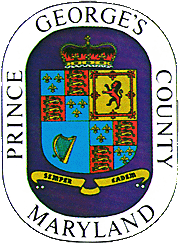
In 17th century North America, immigrants who shared the family name included James Offord, whose name was recorded
as James Offwood in Maryland; Thomas Offord, whose name was spelled Uffitt on the shipping records of the "Lyon," and who's
fathers name was previously spelled "Offott"; and William Offord, who's name is also spelled "Offoot" in the "Court Records
of Prince George's County Maryland," Ophett in Presbyterian Church records, as well as Ofett, and Offett on probate records,
and Offutt on his last will and testament (1732).
William and Mary had eleven children. William died in Prince George's County, Maryland on June 10, 1734. Large tracts of
land were willed to family members under the "Offutt" spelling. Those who inherited land also had their names recorded as
"Offutt" and had no choice but to affirm their identity as such.
|

